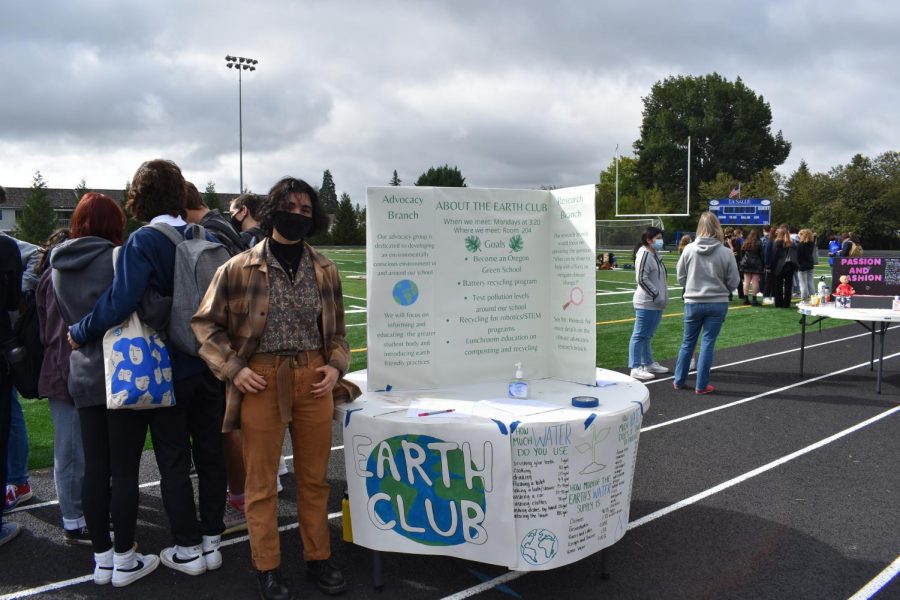The Climate Crisis Urgently Demands Our Attention — Here Are Some Things You Can Do To Help
The Earth Club urges people to get educated about the time-sensitivity and effects of the climate crisis.
October 6, 2021
The climate crisis is one of the most significant issues of our generation. Glaciers are melting, fires are ripping through the nation, and plastic is almost as common as fish in the ocean. It is a daunting topic but something that desperately needs more attention. Sometimes it can feel like an impossible challenge, but there are many things that all of us can do to reduce own carbon footprint.
“Ever since the Industrial Revolution, we as humanity have been polluting a lot,” said Sid Lefranc, junior and co-leader of La Salle’s Earth Club. “Throughout the years of doing that it accumulates and now that we do know that all of that is horrible for our environment, we are still doing it and killing our planet by continuing those practices.”
It is still important for individuals to live a more eco-friendly life, but the biggest thing we can do is urge companies to become more environmentally conscious.
Climate change’s devastating impact on the earth is becoming irreversible, and many different industries are doing irreparable harm to our planet. The fashion industry, for instance, accounts for “10% of greenhouse gas emissions,” according to the BBC, which is the main cause of climate change.
Buying secondhand clothing from sustainable brands can help reduce your carbon footprint. As most clothing ends up in landfills, it’s important to buy clothes you’ll wear regularly. You can also donate clothes to thrift stores or sell them on apps like Depop instead of letting them sit unused in the back of your closet.
Not only does fast fashion production release massive amounts of CO2 into the atmosphere, it takes about 1,800 gallons of water to create a single pair of denim jeans. This is insane.
Although water usage isn’t a leading cause of climate change, it is still something that needs to be reduced. We live in a time where access to clean water, especially in developing countries, is not common.
What can you do to help?
You can be more conscious about when you run your water. Take shorter showers, turn the sink off while brushing your teeth, run your washing machine as little as possible, use your dishwasher intelligently, and don’t waste water scrubbing before putting it in the dishwasher. “When you’re cleaning fruits or vegetables, what I do at my house is I put a bowl or pitcher underneath the vegetables I’m cleaning, and then I’ll water my plants or lawn with it,” Lefranc said.
Although it can be beneficial for the environment, we as individual people cannot stop climate change. The most important thing we can do is demand that big businesses be more climate friendly.
No longer can we afford to put profit over real people.
“Greed is our greatest epidemic,” Lefranc said.
Amazon is one of the biggest CO2 polluter in the world. In 2018, they emitted 44 million metric tons of CO2, a catastrophic amount which is causing our planet to deteriorate. Even if Amazon and other tech companies plan to run on renewable energy by 2030, that might be too late.
Many people feel like that timeline is too far away. Especially when it comes to the government’s goal of net zero emissions by 2050. “I think the goal of net zero by 2050 is kind of a stupid goal, to be honest. It’s way too far in the future. It doesn’t pressure governments enough to take action right now, and it could be so much better,” said Lefranc.
Holding big businesses accountable for not changing their policies is essential for combatting the climate crisis. Writing to government officials in both federal and local offices can force companies to change their behavior.
Getting involved in protests like the Youth Climate Strike that happened recently shows people in power that citizens care and are demanding change.
“I also want to stress that it’s not the fault of everyday citizens and people like you and me,” Lefranc said.” Most of the pollution and waste comes from top corporations, so even though we’re trying our best to make a difference, it’s also about laws that need to go into effect and changes that need to be made.”
For the first time in history, we are having to think about whether or not the earth will be inhabitable for human life if we keep things the way that they are. “I’m honestly really scared for my future, ” Lefranc said. “Sometimes I wonder if I should even be pursuing anything because the earth is gonna die.”
Plastic is invading our oceans at an alarming rate. According to WWF Australia, “Globally, 100,000 marine mammals die every year as a result of plastic pollution. This includes whales, dolphins, porpoises, seals and sea lions.”
Over half of the world’s porpoise species have consumed plastic in their life. They mistake it as a squid or a fish because plastic is almost as common as them in the ocean.
Instead of properly taking care of the world’s plastic, countries dump it into the ocean, creating trash mounds in the ocean. The country of Australia dumps 130,000 tons of plastic into the ocean each year. For reference, the average plane weighs 50 tons.
Lefranc urges people to “know the recycling rules for your area” and be more cautious about what you’re throwing away, recycling, and composting. In order to create change, everyone has to work together.
We need to implore our governments to reduce plastic use, and recycle plastic instead of putting it into our waters.
Focusing on climate change, and being informed about the climate crisis is essential, especially for young people. Joining La Salle’s Earth Club can get you introduced to the climate crisis, and help you to make difference. Tremendous action needs to be taken now, as we cannot afford to wait any longer.
Our earth needs help, and we have to be willing to sacrifice for the greater good.









